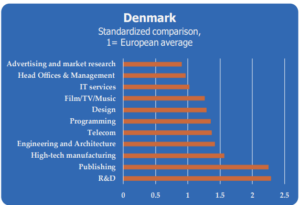News
Denmark leads the way in Europe in R&D employment
This article is more than 7 years old.
High taxes continue to hamper brain business jobs

Strong in research & development (photo: Europe’s Brain Business Jobs 2018)
According to the newly-published 2018 Europe’s Brain Business Jobs Index, Denmark leads the European theatre when it comes to R&D (research and development) employment.
The index (here in English) showed that Denmark has the highest share of R&D employment in all of Europe
“Compared to the rest of Europe, Denmark has a number of strengths. The main strength is in R&D and publishing. In these two areas, the concentration of brain business jobs in Denmark is more than twice the European average,” the report found.
“In R&D, the nation has the highest share of working age population employed in all of Europe. Denmark is also strong in high-tech manufacturing, engineering & architecture, telecom, programming, design and film/TV/music.”
READ MORE: Danish research still packing strong global punch
Cost of living hurdle
However, the report stated that there were weaknesses in advertising and market research, as well as head offices and management. One of the explanations of this could be the high tax levels in the country being off-putting to firms looking to locate head offices to Denmark.
The index also found that Denmark had experienced a decline in brain business jobs as of late, down to 255,654 in 2016 from 262,295 in 2014.
Despite this, the Danes are still well ahead of the European average.
Capital charge
Copenhagen continues to lead the way in Denmark with 13.5 percent of the working age population being employed in brain business jobs – almost twice the national average. The Danish capital ranked eighth in Europe, ahead of Oslo, Helsinki and Berlin, but behind Stockholm.
Midtjylland (7.1 percent), north-Jutland (4.8 percent) and southern Denmark (4.6 percent) also performed admirably, while Zealand was struggling at (2.7 percent).
“At a time when Europe is rapidly moving towards a knowledge-intensive economy, it is important for regions to develop brain business jobs,” said Dr Nima Sanandaji, who is the author of the index.
“These jobs are the driver for future economic well-being, and need to evolve not only in the capital region but throughout the country.”











































